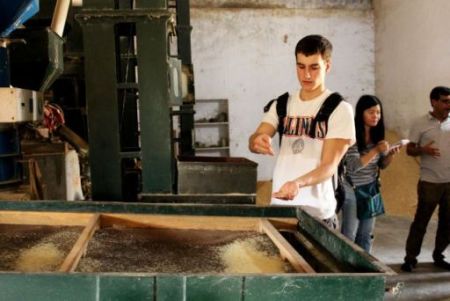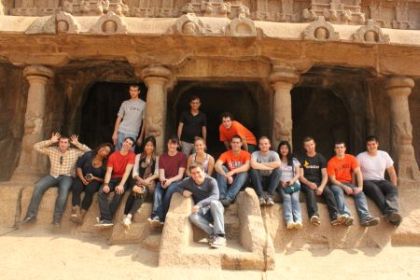Illinois Students Gear Up to Impact Global Food Security
by Kari A. Wozniak

The world has a huge problem. The global population is growing rapidly, diets are shifting, and systems of trade are increasingly diverse. 842 million people went hungry or were malnourished in 2013, and the continent of Africa, which will see a population increase from 1 billion to 2 billion by 2050, remains unable to feed its people. This huge problem – how to feed the world – is one that students at the University of Illinois at Urbana-Champaign are poised to solve.
On January 5, Supply Chain Management undergrads from the U of I College of Business will travel to India for a 10-day field study of postharvest losses in agricultural supply chains. The group of fifteen will visit four cities as well as several rural sites across the country and observe how grains such as wheat and rice are stored, processed, transported, sold, and regulated. Around the world, estimates suggest that up to one-third of all food grown each year is lost or wasted, with most of the problems in developing nations occurring in supply chains from harvest to wholesale. Efforts to save food that is already grown are increasingly looked upon by experts worldwide as a means to produce solutions for the world’s problem of feeding more with less while protecting the environment.
Promoting field experiences like a trip to India is one way the University of Illinois prepares students to address challenges of the 21st century, a mission the ADM Institute contributes to as a globally-focused research institute based at the Urbana campus. When asked why this trip is so important for his students, course instructor Professor Udatta Palekar explained that firsthand observation is crucial. “Supply chain students in the U.S. tend to study the relationships between large-scale firms and institutions. In countries like India and many others, this is not the dominant makeup of food systems.” Palekar’s objective is for students to see how these systems function differently, and how people operate within them. “When they understand what factors are involved in producing food and why people make the decisions they do, their ability to think critically about problems and how to go about solving them is greatly enhanced”.

Although many of the students going on the trip have traveled internationally before, none have visited culturally-rich India, an experience that they are greatly looking forward to. They are also ready to reap the benefits of this unique opportunity for hands-on learning. Supply Chain Management junior, Rachel Bessonny, says that many of her peers have not yet taken their core classes, making the trip an important “jumpstart” into the curriculum for the group. Bessonny, who expects that her time in India will greatly enhance her internship this summer at agriculture multi-national John Deere, is excited to hear from farmers themselves, and learn how they deal with problems that seem so large. “I have heard of the major statistics about postharvest loss and I know that it is a serious problem. Seeing how the farmers cope with this issue on a daily basis is going to be really interesting”.
With support of the ADM Institute, Palekar opens doors for his students to interact with key actors such as policymakers, farmers, industry representatives, and members of civil society groups. The January trip builds on the success of one taken last year, which accompanying ADM Institute staff Grace Kenney said allowed students to make “life-changing connections”. This year, students will be adding to their learning and impact by writing blog articles and sharing their experiences in India on social media throughout the trip. The hashtag will be used: #PHLstudents.
The ADM Institute currently supports four courses for both undergraduate and graduate students. Besides trips to India, ADM has also sponsored students to study in Sierra Leone. The institute partners with professors, instructors, and student organizations to bring meaningful educational and professional opportunities to their classrooms and programs such as internships, presentations, and workshops. To view photos from last year’s trip, visit ADM Institute’s Flickr album.